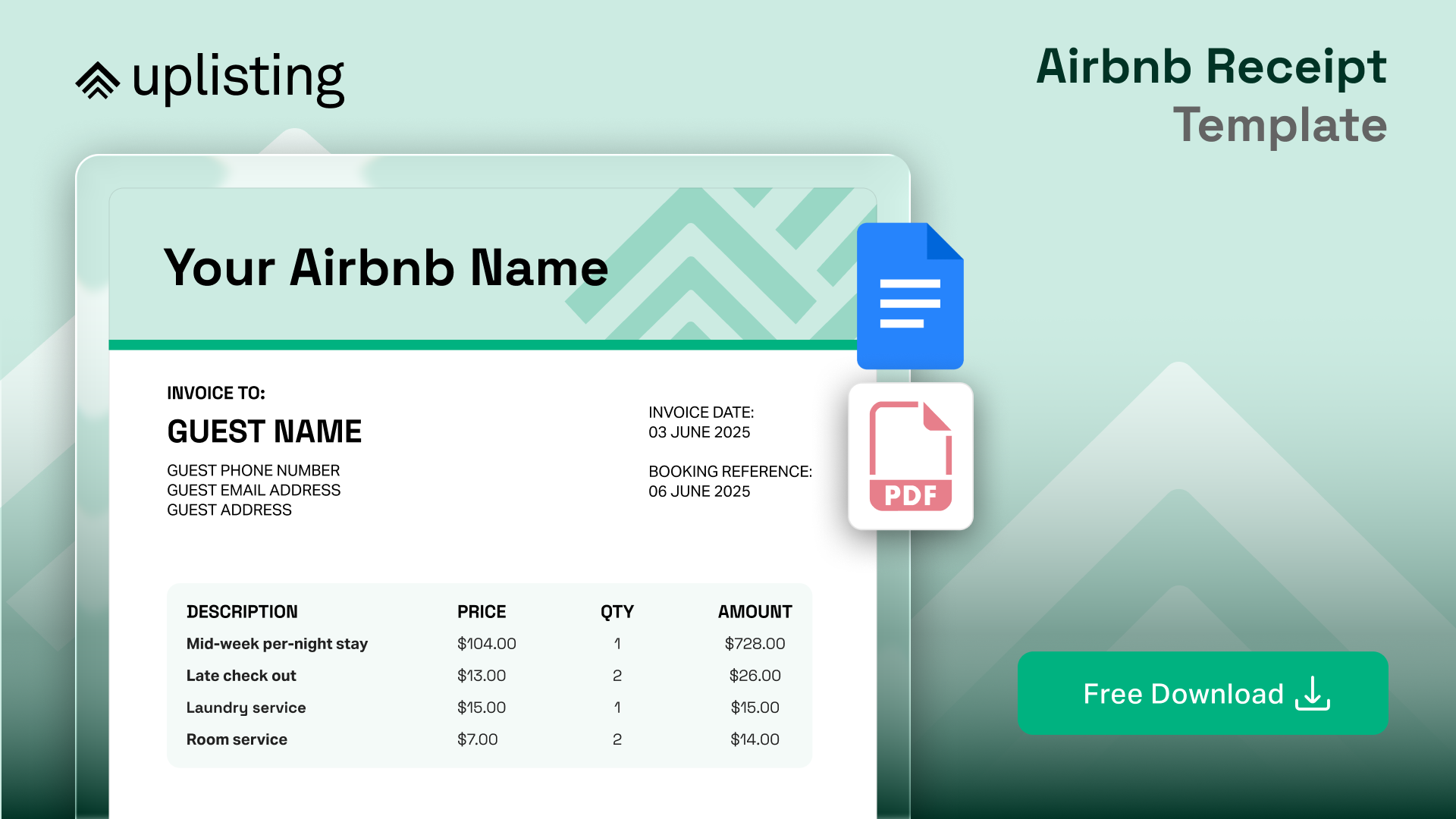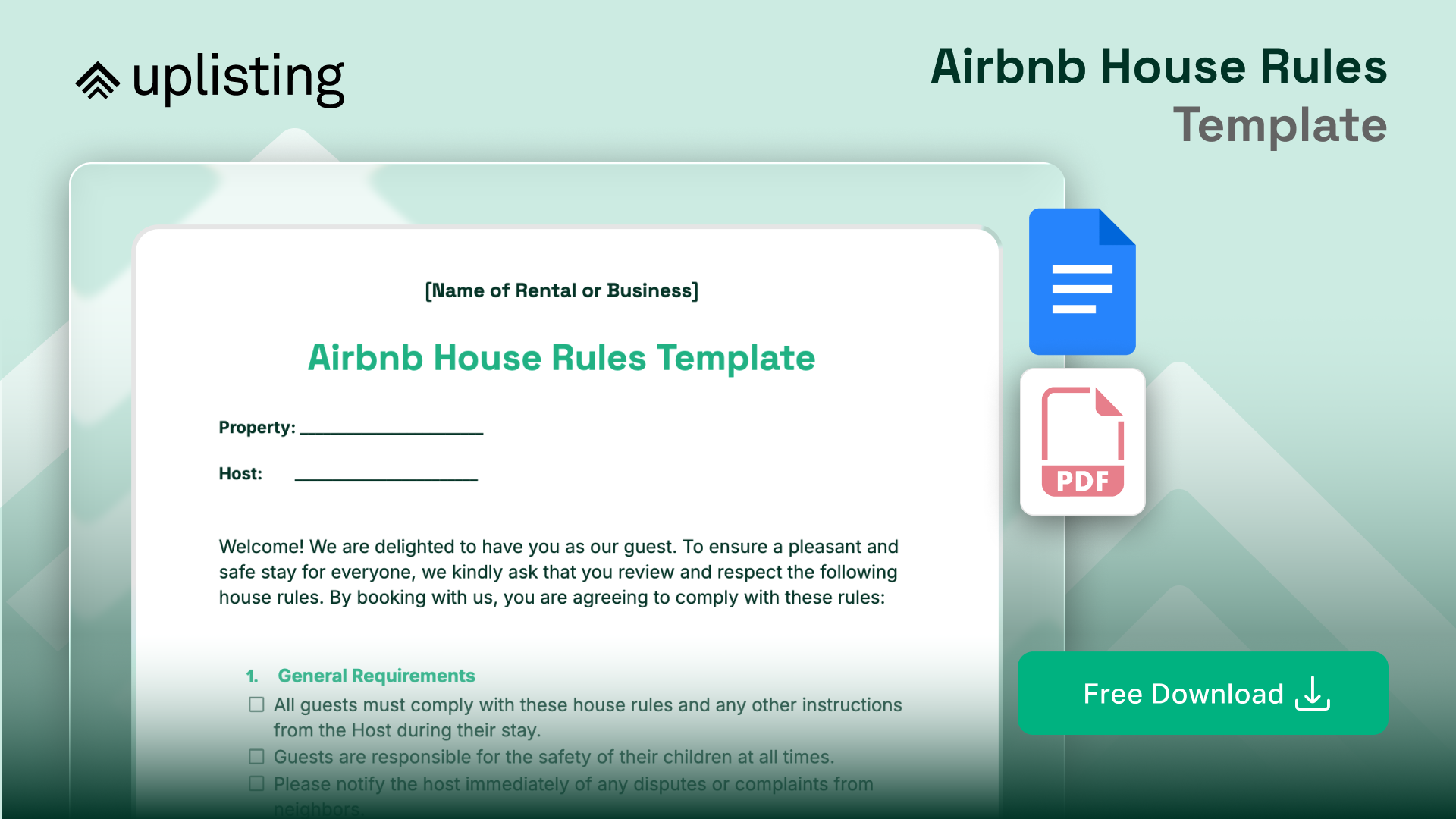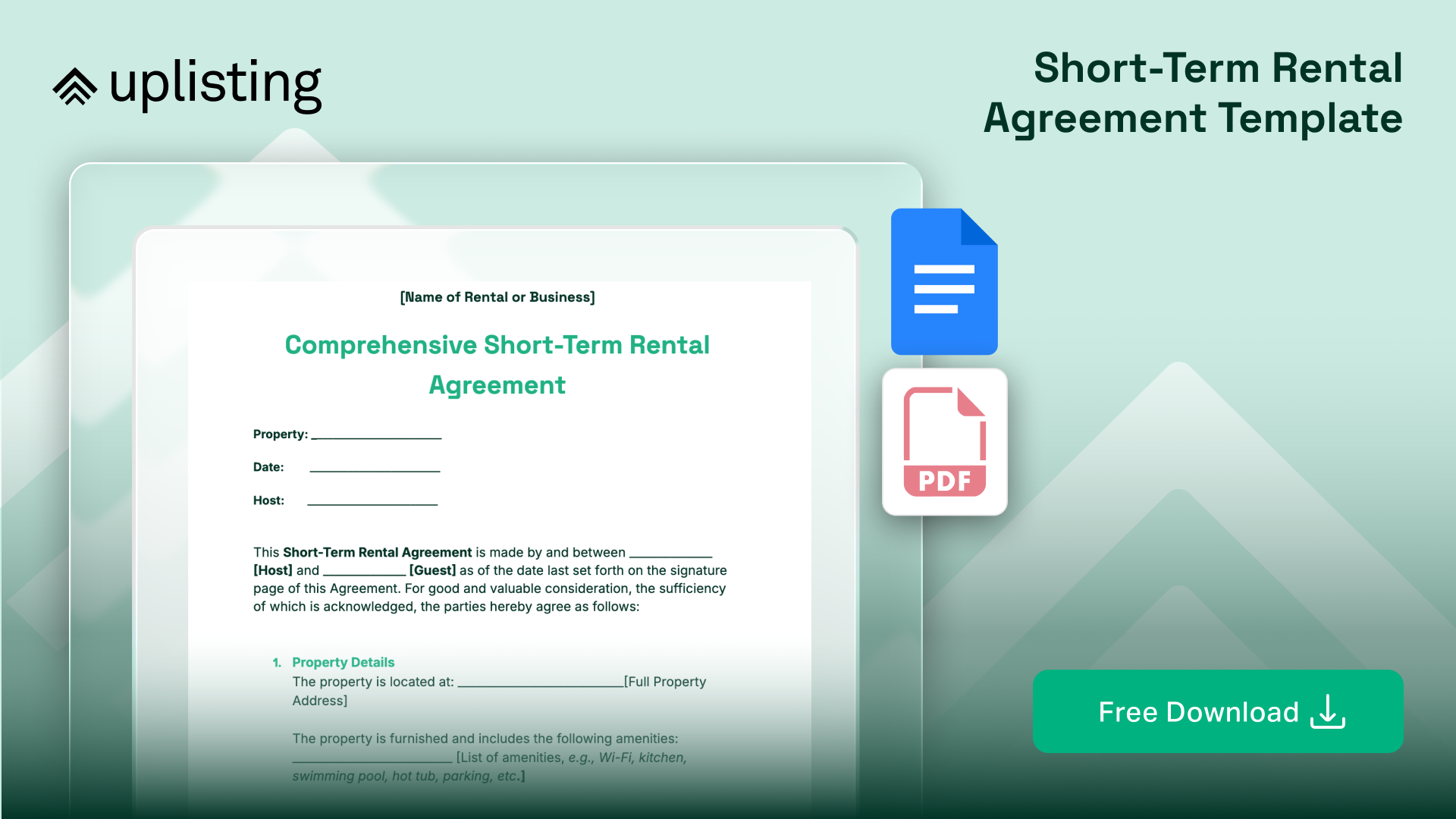Key Takeaways
You can become an Airbnb host without owning property through co-hosting or rental arbitrage.
Co-hosting offers experience with minimal risk, while rental arbitrage trades higher profit for greater responsibility.
Both paths to running a short-term rental business depend on trust, legality, and strong systems to keep operations running smoothly.
Automation tools like Uplisting help non-owners streamline daily management and scale faster.
You don’t need to own a beach house or downtown condo to make money on Airbnb. In fact, some of the platform’s most successful hosts don’t own a single property. They’ve simply learned how to manage, lease, or partner with others who do.
It’s a clever shift in how people think about hospitality. Instead of waiting years to buy real estate, entrepreneurial hosts are using access instead of ownership to build profitable Airbnb portfolios. Some start by managing listings for busy homeowners. Others lease apartments, furnish them beautifully, and rent them short-term for a higher nightly rate.
These models, known as co-hosting and rental arbitrage, have opened new doors for anyone willing to think like a business owner. They combine people skills, organization, and a little tech-savvy to generate consistent income, even without holding the deed.
But success without ownership doesn’t happen by chance. It takes structure, clarity, and the right systems to stay compliant, keep guests happy, and scale sustainably.
That’s where Uplisting comes in. By automating guest messages, syncing calendars, and coordinating cleaning schedules, Uplisting helps non-owners manage multiple listings like seasoned pros, turning side hustles into streamlined, scalable businesses.
In this article, we’ll explore how to become an Airbnb host without owning property, the differences between co-hosting and rental arbitrage, and how to run your business efficiently from day one.
Why Non-Owners Are Entering Airbnb Hosting
The days of needing a down payment or a mortgage to become an Airbnb host are fading fast. In today’s market, plenty of hosts are proving that you can build a profitable short-term rental business without ever owning a property.
Rising real estate prices, tighter lending rules, and shifting travel habits have opened the door for new models of hosting. Instead of tying up capital in property purchases, savvy entrepreneurs are focusing on management and access, earning income through organization, hospitality, and smart partnerships.
There are two main paths for non-owner hosts:
For many, the first foray into the short term rental business starts with co-hosting, managing an existing owner’s listing for a share of the profits. Co-hosts handle the day-to-day work that owners don’t have time for; they coordinate cleanings, respond to guests, and keep listings performing at their best. It’s a low-risk entry point that builds experience, credibility, and cash flow before investing in a lease or property.
Others pursue rental arbitrage, where you rent a property long-term and sublet it on Airbnb for short stays. When done legally and transparently, it’s a fast-track to building a scalable business; the host earns the difference between rent and nightly bookings, while the property owner enjoys reliable tenants and consistent income.
You’re in great company
Sign up
Some of the largest short-term rental operators (with 250+ properties) rely on Uplisting's software to scale their businesses.
How Airbnb Co-Hosting Works
Co-hosting is the simplest way to start earning on Airbnb without owning a property. It’s the perfect entry point for anyone who wants to learn how the platform works, build a track record, and earn a share of income while managing someone else’s listing.
As a co-host, you act as the property owner’s right hand. You handle the daily details that make the guest experience seamless, from communication and scheduling to cleaning and reviews.
What co-hosts do
Co-hosts are responsible for nearly every operational task that keeps a listing running smoothly. They:
Answer guest messages and manage booking requests quickly and professionally.
Arrange check-ins, cleanings, and maintenance between stays.
Keep listings optimized with updated photos, descriptions, and dynamic pricing.
Monitor guest reviews and implement improvements to maintain five-star status.
By managing these details, co-hosts free up the owner’s time while ensuring guests get the best possible experience.
How co-hosts get paid
Payment structures vary, but most co-hosts earn 10% to 30% of the booking revenue, depending on their level of involvement. Some charge a flat monthly fee, while others offer tiered management packages that include extra services like professional cleaning coordination or guest welcome kits.
The key is clarity; all fees, responsibilities, and payout schedules should be agreed upon in writing before any bookings go live.
How to find co-hosting opportunities
The easiest place to start is close to home. Ask friends, family, or local property owners who already have Airbnb listings if they need help managing them. You can also join Facebook or Reddit communities for Airbnb hosts, or use Airbnb’s Co-Host Marketplace where available.
Another smart approach is reaching out to real estate investors or landlords who don’t have time to manage short-term rentals themselves. By presenting co-hosting as a way to maximize their property’s potential while removing their workload, you position yourself as a valuable partner, not a middleman.
What Is Airbnb Rental Arbitrage
Rental arbitrage is one of the most popular ways to build an Airbnb business without buying real estate. In simple terms, it’s the process of leasing a property from a landlord, furnishing it, and then listing it on Airbnb for short-term stays. The goal is to earn the difference between your monthly rent and what guests pay per night.
How the arbitrage model works
Here’s how it plays out in practice. You sign a long-term lease that explicitly allows subletting or short-term rentals. You then furnish the property with comfortable, durable essentials and list it on Airbnb or Vrbo. When bookings come in, you keep the revenue, pay the monthly rent, and pocket the profit.
It’s a straightforward model, but success depends on professionalism and transparency. Landlords and local authorities are far more receptive to responsible operators who use written agreements, keep properties well maintained, and follow the law.
Legal and financial considerations
Before jumping in, make sure your business is built on solid ground. Always disclose your plans to the landlord; hiding your intent can lead to eviction or legal issues. Check your city’s short-term rental regulations, as some areas require permits, tax registration, or business licenses.
Financially, you’ll need to plan for startup costs such as security deposits, furnishings, utilities, insurance, and photography. Think of it as setting up a mini hotel, one that must stay booked often enough to cover expenses and still generate profit.
When rental arbitrage makes sense
This model tends to work best in cities or neighborhoods with strong short-term rental demand, such as areas near tourist attractions, hospitals, or major business districts. It’s also well suited for operators who already have some hosting experience or who plan to manage multiple units at once.
The main challenge is balancing the upfront investment with potential earnings. When done right, rental arbitrage offers rapid scalability and solid cash flow; when done poorly, it can become a liability.

Create 5-star guest experiences
Give your guests unforgettable experiences
With Uplisting, you can send the right messages at the right time on all booking sites. Read and respond to guest messages in a single, unified inbox — whether you’re at the office or on the go.
Which Model Is Right for You?
Both co-hosting and rental arbitrage can be profitable, but they cater to different goals and comfort levels.
The right choice depends on your risk tolerance, available capital, and how hands-on you want to be in the business. Let's take a look.
Co-hosting: low risk, high learning curve
Co-hosting is ideal for beginners who want to learn the ropes without making large financial commitments. You don’t need to sign leases, furnish properties, or pay utilities; instead, your investment is time and attention.
It’s a great way to understand how guest communication, pricing, and turnover management work before expanding into something more complex. Co-hosting also builds credibility. Once you’ve managed a few listings successfully, it becomes much easier to pitch your services to landlords or investors.
Rental arbitrage: higher risk, higher reward
Rental arbitrage appeals to hosts ready to treat Airbnb as a full-fledged business. The earning potential is greater, but so is the responsibility. You’ll cover rent, utilities, and upkeep, which means occupancy and pricing strategies directly affect your bottom line.
This model rewards operators who are organized, financially disciplined, and willing to take calculated risks. When done properly, it can be scaled quickly and one profitable unit can soon lead to five or ten more.
Choosing your path
Ask yourself a few key questions:
How much time and money can I invest right now?
Am I comfortable managing guest expectations and property maintenance?
Do I want to build experience first, or am I ready to go all in?
If you’re starting small or testing the waters, co-hosting is the safest and smartest way to begin. If you’re entrepreneurial and ready to take on financial responsibility, rental arbitrage may be the faster path to building a business that scales.
In either case, professionalism is what separates casual hosts from successful operators. With Uplisting, you can automate repetitive work (from guest communication to cleaning coordination) giving you the tools to run a seamless business whether you manage one property or many.
Building a Profitable Airbnb Business Without Ownership
Owning property might open doors, but it’s no longer the only way to build a successful Airbnb business. Co-hosting and rental arbitrage have made it possible for anyone with drive, organization, and a good eye for guest experience to step confidently into the world of short-term rentals.
Whether you start small with one listing or scale to several, the key is professionalism. Clear communication, reliable systems, and consistent guest experiences are what separate thriving hosts from those who burn out early. Every five-star review, quick response, and seamless check-in adds credibility, the currency that builds long-term success.
That’s where Uplisting makes all the difference. By automating repetitive tasks like guest messaging, calendar syncing, and cleaner scheduling, it gives non-owners the same level of efficiency as full-time property managers. You can focus on relationships, growth, and profitability, while Uplisting handles the behind-the-scenes operations that keep everything running smoothly.
In short, you don’t need to own the property to own the business. With the right systems in place, your Airbnb journey can be every bit as rewarding, and scalable, as that of any investor.
If you're ready to take the next step and run your short-term rental business like a pro, sign up for Uplisting today.
FAQs About Becoming an Airbnb Host Without Owning Property
What’s the difference between co-hosting and property management?
Co-hosting usually puts you in charge of daily guest support (messaging, turnovers, and key handoffs)while property management covers everything from adjusting prices to arranging repairs and handling legal compliance.
Property managers tend to take on bigger responsibilities, including contracts and maintenance, and usually earn a higher fee for the extra work. Co-hosts stick to guest-facing jobs and split booking revenue with owners.
How do I convince a landlord to allow Airbnb arbitrage?
Start with a clear, honest pitch. Outline how prompt rent payments, professional cleaning, and regular inspections keep apartments in top shape. Present a written sublease agreement, offer references from past rentals, and highlight how you’ll keep communication open about guest stays. Landlords often appreciate reduced vacancy risk and consistent care for their investment.
How much can I earn as an Airbnb co-host?
Earnings vary by city, size of listing, and your agreement with the owner.
Most co-hosts see 10% to 30% of booking revenue per property, with higher percentages for full-service support that covers everything from messaging to turnovers. Some owners prefer flat monthly fees, especially for high-volume listings.
Is co-hosting available in every country?
No, Airbnb limits co-hosting features and payment options to certain countries and regions. Check Airbnb’s local site or help center for updated lists of supported areas, as well as payout restrictions or local regulations that might affect your setup.
What are the biggest risks of hosting without owning a property?
Several risks come with hosting on leased or managed properties. Bookings can fluctuate month to month, cutting into your monthly earnings. Repairs or damages can eat into profits, especially when guest turnover is high. Sudden local rule changes or revoked landlord approval can shut down your operation with little notice.
Strong agreements and proactive communication keep your business safer if you're figuring out how to become an Airbnb host without owning property.
















.png)

